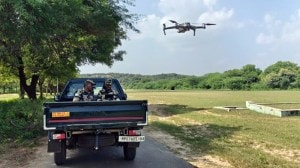Basu snubs Left allies to back Buddha
A powerful stamp of approval for West Bengal Chief Minister Buddhadeb Bhattacharjee’s ambitious plan to build an industrial park with I...

A powerful stamp of approval for West Bengal Chief Minister Buddhadeb Bhattacharjee’s ambitious plan to build an industrial park with Indonesia’s Salim group has come from Jyoti Basu, the most authoritative voice in the CPM.
Two days before the party’s politburo meets to discuss, among other things, objections raised by some Left leaders to Bhattacharjee’s reforms process, Basu, speaking exclusively to The Indian Express in Kolkata said: ‘‘There is absolutely nothing unfair in what Buddhadeb is doing with the Salim Group. There is absolutely no problem.’’
When asked about voices of protest from within the Left Front—most loud being that of the Forward Bloc—Basu said: “The Left partners have misunderstood Buddha’s trip to Indonesia and Singapore. What’s wrong in it? Nothing. Buddhadeb has already explained everything through a press conference.”
‘‘Within the CPM, there were doubts about agricultural land being taken up for the Salim project,’’ Basu said.
‘‘The confusion was over fertile farmland being acquired but that has been sorted out and the party’s South 24-Parganas district committee has been dealing with the process of identification of land.’’
He said that land for a two-wheeler factory has already been given to the Salim Group in Howrah. ‘‘There is no problem. I am going to Delhi. More details will emerge in course of our discussion,” he said.
Basu’s reference to the Left partners ‘‘misunderstanding’’ Bhattacharjee’s trip is significant. For, at a public rally in Barasat last Sunday, he had indeed mentioned that some Left leaders had complained to him. Significantly, the most vocal opponents among the LF partners has been the Forward Bloc which had to drop two ministers from the government during Bhattacharjee’s regime. Both had serious corruption charges against them.
Also, the Forward Bloc has for long been making noises over Bhattacharjee’s policies, from privatization of health services and eviction of squatters to seat-sharing and reform of liquor licences.
As for the other dissenters, Bhattacharjee’s party colleague and politburo member Anil Biswas played a crucial role. He silenced murmurs of protest in the initial stage with a statement saying: “Industries do not come up in the sky. We must provide land for industries if we want to take the state forward.” Words on the same wavelength as that of Bhattacharjee.
The politburo is expected to look for an assurance from the chief minister that a proper rehabilitation plan for land-losers is in place when the final papers for the project are drafted. It might also advise Bhattacharjee that an attempt should be made to keep the number of land losers to the minimum. Meanwhile, on a busy Wednesday—that started with the meeting of the National Integration Council—Bhattacharjee had more reason to cheer in the capital.
Industries Minister Kamal Nath, with him by his side, said that West Bengal would be the focus state at this year’s India International Trade Fair.
Talking to reporters after the meeting at Nath’s house, Bhattacharjee said Kamal Nath was personally looking into several projects involving West Bengal that included, among other things, the infrastructure of Haldia. “For all this he (Kamal Nath) has sanctioned sufficient funds,” he said. The CM said the state was “always trying to attract investment”.
Other projects discussed between the two on Wednesday was the one for a special economic zone from Majerhat to Budge Budge.
Referring to the issue of FDI in retail, Kamal Nath said that the West Bengal CM had concerns that no FDI should replace or displace existing employment and that FDI should be geared towards employment. “All new FDI policies should have that focus,” Nath said.
He said they discussed the issue of the entry of Metro company. The Minister said he had been told they would only come into ‘‘wholesale and not the retail market.’’
The West Bengal CM was emphatic that he stood by “all the statements” he had made in Singapore and Indonesia. He said he would go by experience and adopt a pragmatic approach and not be weighed down by Marxist dogma. “The world is changing,” he said.
Later, after a meeting with the Prime Minister, he said: ‘‘I discussed my trip and we talked about problems in West Bengal.’’
Photos





- 01
- 02
- 03
- 04
- 05

























